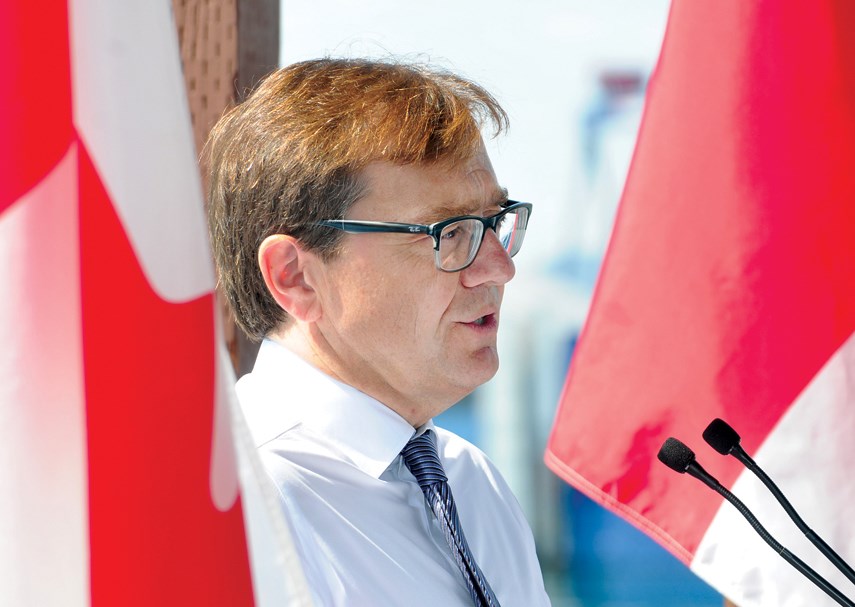Minister of Environment and Climate Change Jonathan Wilkinson defended his government’s record on climate action and pledged to do more, at a meeting with faith leaders in North Vancouver Wednesday.
Wilkinson met with about 40 volunteers, including approximately 10 North Shore faith leaders, for a dialogue on climate change action.
Many of those pressed Wilkinson to do more to fight alarming signs of climate change.
“We can lend support for doing more,” said Oleh Ilnyckyj, a member of Highlands United Church's Kairos Love of Creation climate action group and one of the event organizers.
“This is a time for action.”
The meeting this week comes as the United Nations’ Intergovernmental Panel on Climate Change released a report pointing to human actions as having changed the climate in “unprecedented” ways, some of which it said are now irreversible. António Guterres, the UN secretary general, described the report this week as a “Code Red” for humanity.
Wilkinson said events like the wildfires that have swept across B.C. this summer have reinforced the issue of climate change as an immediate public concern.
Climate change is 'happening now,' says minister
“It’s not an issue that’s five years away or 10 years away. ... It’s happening now,” he said. “Governments around the world need to take aggressive action.”
He added that while most Canadians have understood climate change as a challenge, “I think that people always thought that it was a little bit further away, and that perhaps we had more time. And I think what the wildfires have done, and not just the wildfires, the flooding in Germany and Belgium and Holland, and the wildfires in Greece, are showing that the effects of climate change are with us today. They are quite dramatic in some cases, and they are going to increase unless we actually get very aggressive and ambitious with respect to reducing greenhouse gas emissions.”
Wilkinson defends Ottawa's climate plan
Rev. Ross White, of Highlands United Church in North Vancouver, described the climate emergency facing the world as a “spiritual issue”. He said he hopes government will “take the long view ... it won’t just be the fix ... to dance around the next election cycle.”
Wilkinson defended his government’s record on climate action to date, pointing to Ottawa’s plan to achieve climate targets. Those include plans to increase carbon pricing and legislation that requires governments to have a plan to address climate commitments every five years, he said.
He added for a significant proportion of the public, economic factors are still an issue. They are looking for ways to do things differently “that are not going to cost you enormous amounts of money,” he said.
He added he is optimistic that technologies under development will help to achieve that goal.
Some changes will 'take time'
Wilkinson said other changes – like moving fully to zero emission vehicles – currently planned to be phased in between 2035 and 2050 – will take time.
Charlene Aleck, an elected councillor with the Tsleil-Waututh Nation, pressed Wilkinson on how the federal government can justify buying and building the Trans Mountain pipeline to export Alberta oil while also claiming to be working towards addressing climate change.
Minister pressed on pipeline
“We’ve been very vocal about opposing the Trans Mountain pipeline,” said Aleck.
In an interview, Wilkinson said that’s a question that comes up often in North Vancouver, where Wilkinson is a Liberal MP.
He said the pipeline is part of an “economic transition” to a more environmentally sound economy.
“While we continue to use oil, which is primarily used as a transportation fuel, Canada obviously wants to extract the full value for its resources, which it doesn't right now, because we have one customer, which is the United States. And so the focus is on ensuring we get fair value. We have committed to all of the profits, the tax revenues generated by the pipeline, will be reinvested in accelerating the transition,” he added.
Some members of the faith group asked Wilkinson Wednesday what the government was doing to show people what they can do as individuals to make a difference.
But Wilkinson said when those questions have been asked in focus groups, “What people really liked was when we said ‘We’re going to make big emitters pay more.’ They didn’t like so much saying they should do something. And so that’s something we’re going to have to figure out how to overcome.”
Wilkinson said one of the people who pushes him hardest on climate issues is his 18-year-old daughter “who is obviously very, very concerned about the climate crisis, and the future for her generation.”
Wilkinson represents the riding of North Vancouver.
Prime Minister Justin Trudeau is widely expected to call an election as early as this weekend.





